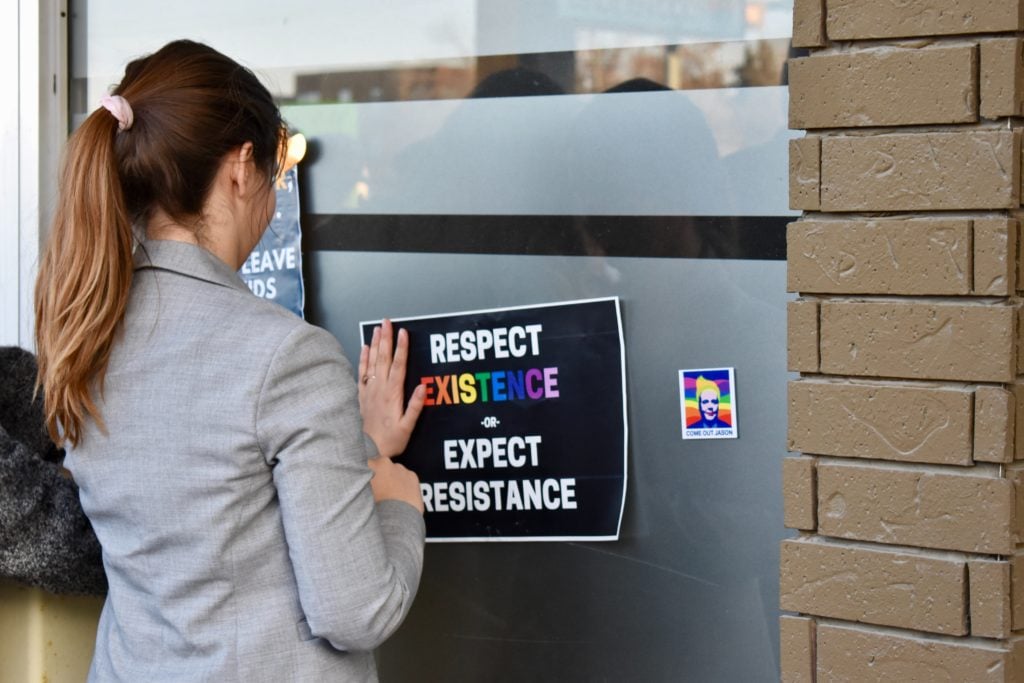
2021 has already become a record-setting year for political and legislative attacks on trans rights just three-plus months in as a majority of state legislatures have introduced and/or passed more than 100 bills promoting social and medical discrimination against trans populations, most notably trans youth.
33 states have introduced anti-trans bills so far this year, with many of those bills targeting trans women's participation in sports and gender-affirming healthcare for trans youth. The sheer amount of anti-trans legislation is a lot to parse, so here is a quick rundown:
Discrimination of trans women in sports
With no hard evidence or data to root their discriminatory measures, conservatives point to them as being “proactive” to what GLSEN interim director Melanie Willingham-Jaggers describes as “a solution in search of a problem.”
“There is no categorical dominance by trans athletes, but we do understand the categorical benefits for young people who play sports,” Willingham-Jaggers told CNN. Despite that lack of evidence, 31 states have introduced legislation that would ban trans women from participating in sports at the high school and collegiate level. Three of those states, Arkansas, Mississippi and Tennessee, have already signed such bills into law.
Many of the bills are derived from a trans-exclusionary bill that Idaho signed into law in 2020. According to the Idaho Press, that law was reportedly crafted with the aid of the Alliance Defending Freedom, a notoriously anti-LGBTQ legal organization. While the Idaho law was quickly struck down by a federal judge, it hasn't stopped other conservatives from using its blueprint.
The bill vetoed by South Dakota Governor Kristi Noem earlier this year followed this rubric. Though those bills were vetoed, Noem signed a series of executive orders banning trans girls and women's participation in high school and collegiate sports.
But other states have taken some of the more pervasive measures within the original Idaho law and gone one step further. The Florida House of Representatives passed a bill on Wednesday that would subject student-athletes to “genital inspections” should someone dispute their gender identity or sex. Speaking to the Orlando Weekly, State Rep. Michele Rayner described the measure as “state-sanctioned sexual assault against children.”
The NCAA released a statement earlier this month in support of trans student-athletes inferring that it would only hold championship events in locations “free of discrimination.”
Denial of gender-affirming healthcare

The swathe of bills aimed at denying gender-affirming care for trans youth and adults is potentially more damaging in the long run. Fewer states (20) currently have bills upholding medical discrimination of trans people within their legislative docket. Many of these proposed laws would prohibit access to puberty blockers and hormone replacement therapy (HRT) to trans people under the age of 18, though a bill proposed in North Carolina would extend that age limit to 21.
Earlier this month, Arkansas became the first state to sign this legislation into law after the state's General Assembly voted to override Gov. Asa Hutchinson's veto of the Arkansas Save Adolescents from Experimentation Act. A bill currently in Alabama's state legislature would make it a felony to provide gender-affirming care to trans youth.
[T]here is a desire that is incredibly transparent, though under talked about, to stop people from being trans.
Chase strangio
These measures prove far more detrimental to the physical and mental well-being of trans populations nationwide. According to a 2020 study on the mental health of youth with gender dysphoria published in Pediatrics, receiving gender-affirming care earlier in life leads to better mental health for trans and non-binary youth later in life. A separate study also published by Pediatrics found that access to puberty blockers during adolescence led to lower risks of suicidality in trans adults.
Those findings point to how much long-term harm these bills can potentially cause. According to The Trevor Project's 2020 National Survey on LGBTQ Youth Mental Health, 52% of trans and non-binary youth have considered suicide. Considering that these bills, if signed into law, could affect roughly 25% of trans youth in the U.S., conservative-led government bodies stand ready to adversely affect the lives of thousands.
Limitations on speech and education, and the next step
Beyond the tangible effect on trans bodies, seven states are currently debating bills that would place limits on speech, identification and the ability to educate minors on LGBTQ issues. Iowa is weighing proposals to require parental consent for teachers to discuss gender identity with students in their classrooms, a mandate that teachers include the phrase “the potential harm and adverse outcomes of social and medical gender interventions” when discussing gender identity as part of the curriculum and the removal of gender identity as a protected class under the state's civil rights act.
Bills in Tennessee would allow parents to opt their children out of courses that discuss LGBTQ issues and prohibit teachers from discussing LGBTQ issues in their classrooms altogether. Arkansas has a proposed measure that would require teachers only refer to students by their “biological sex.” Multiple states are considering legislation that would limit the use of gender identity on government-issued identification and other documentation.
It all amounts to what can be clinically defined as a lot. That doesn't mean that the fight is over, though. The American Civil Liberties Union (ACLU) is already mobilizing to file litigation against the laws that have been signed. “Right-wing attacks on LGBTQ existence have largely, for decades, leveraged this moralistic panic about protecting kids that is not at all about protecting kids but about using the language of protecting women and children largely. That paternalistic, patriarchal language that is used to fuel governmental consolidation of power,” said Chase Strangio, ACLU Deputy Director for Transgender Justice., during an appearance on the ACLU podcast At Liberty.
“What is very much specific to this conversation, and why kids are the centerpiece of it, is there is a desire that is incredibly transparent, though under talked about, to stop people from being trans,” he added. “The goal is to prevent transness.
Movements are being made a the federal level as well. The Equality Act, which aims at adding gender identity and sexual orientation as protected classes at a federal level under the 1964 Civil Rights Act, passed in the House and currently awaits debate in the Senate.



